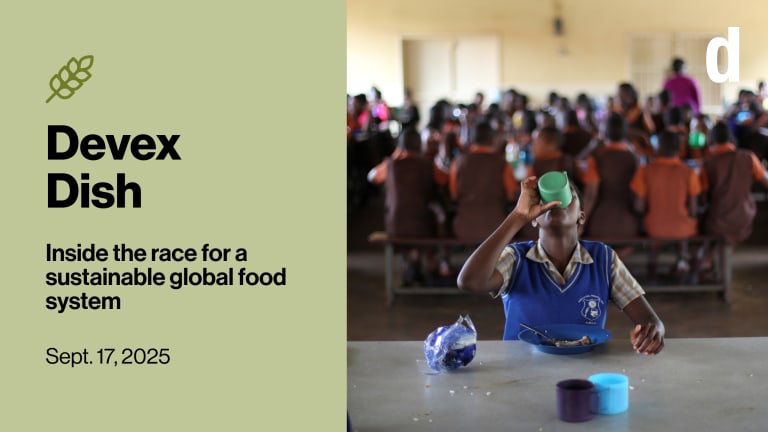
WASHINGTON — A new program by Nespresso aims to revive or jump-start the coffee industry in countries experiencing political conflict, economic hardship, or environmental disaster.
Since the 1980s, national coffee production in Zimbabwe, for example, has dropped approximately 97%, dramatically reducing an industry that once produced some 15,000 tons of coffee a year, according to officials from Nespresso and international nonprofit TechnoServe.
Nespresso invests in the southern African country and other fragile states for two reasons: to protect coffee varieties and farmer communities, and because U.S. customers are interested in the story behind their favorite beverage, said Guillaume Le Cunff, the president and CEO at Nespresso USA. Coffee produced through the initiative will be sold under Nespresso’s Reviving Origins brand.
In terms of farmer interest in program participation, “It’s based on long-term commitment, trust, the incentive they will sell to us because we pay a good price and support technical assistance,” he said.
Nespresso has worked with about 100,000 farmers through similar programs and about 90% choose to continue to supply the company, he said. Farmers in the program aren’t required to sell to Nespresso, but the company pays a premium for the high-quality beans and guarantees that it will buy what the farmers produce.
In Zimbabwe, Nespresso has partnered with TechnoServe to help train farmers and improve the quality of their beans and yields. TechnoServe’s CEO Will Warshauer called coffee “grassroots capitalism” that can help families out of poverty. Already, the nonprofit’s work in Zimbabwe with Nespresso is doubling, or in some cases tripling, the incomes of smallholder coffee farmers, with more gains expected as yields improve, Warshauer said.
“It doesn’t immediately obliterate poverty, but in many cases, the gains are substantial and meaningful,” Warshauer said, adding that even an extra $300 a year in income can provide a boost out of poverty and allow families to invest in education, health, and housing.
It’s not the first time TechnoServe and Nespresso have partnered to build coffee production and improve the livelihoods of coffee farmers in challenging environments. The two worked together to help grow South Sudan’s coffee crop, which shipped the first exports in 2016, five years after the partners started work. While the program was successful, according to Le Cunff and Warshauer, and improved farmer livelihoods and yields, it was suspended as the conflict escalated and forced many farmers to flee and TechnoServe to withdraw its staff.
Some of the programs since, including in Zimbabwe, share common elements, including the type of training — TechnoServe works with locals selected as trainers to teach farmers how to better care for the crop, plant new trees, and work to improve local processing to raise the quality.
Some of the lessons from South Sudan are being applied now and could be relevant to other organizations as well: “There is so much uncertainty and volatility, you need a partner willing to be flexible and make a longer-term commitment,” Warshauer said.
Companies must be willing to go into a new environment and learn what will work, Le Cunff added. In South Sudan, for example, the program grew slowly and started with a lot of learning about the needs of the community. Approaches also have to be holistic and comprehensive — they cannot fail to address key issues such as water or climate resilience, he added.
In Colombia, the program has piloted a weather insurance program for some of the farmers it works with, helping them to be more climate resilient.
These programs also have a strong business case both for the company and for the smallholder farmers, which is key to success, Warshauer said.
Nespresso typically makes a five- to 10-year commitment, and sometimes longer depending on the local context, Le Cunff said. The Reviving Origins program pledges $9.8 million over five years, and Nespresso is exploring other potential countries it could work in, including the Democratic Republic of the Congo.
TechnoServe may be engaged in an area for less time, typically about three harvest seasons, by which time farmers have typically built up their skills and improved trade, allowing the organization to move on to other areas or groups of farmers, Warshauer said. Throughout the program, TechnoServe does not provide anything for free and instead helps connect farmers to markets and to suppliers of inputs. The goal is that when they leave, the farmers can maintain those commercially viable relationships, he said.
As for the partnership in South Sudan, the situation is in flux, but both Nespresso and TechnoServe want to restart work once the security situation allows, which in a best-case scenario could happen later this year, Warshauer said.
Consumers can already buy Nespresso coffee sourced in Zimbabwe and Colombia through its partnerships, and in the next few years, they will be able to buy coffee from Puerto Rico, where Nespresso is supporting farming efforts after 80% of the trees were destroyed by Hurricane Maria, Le Cunff said.
Update, May 22, 2019: This article has been updated to clarify the headline.






